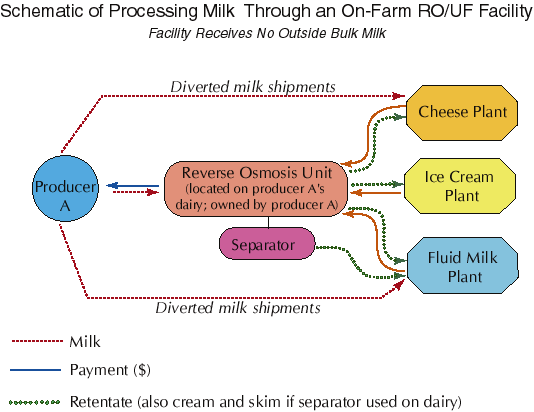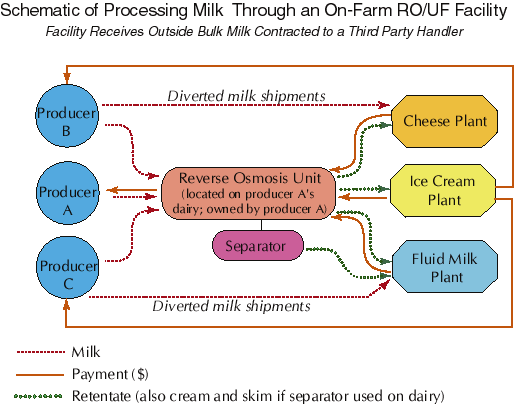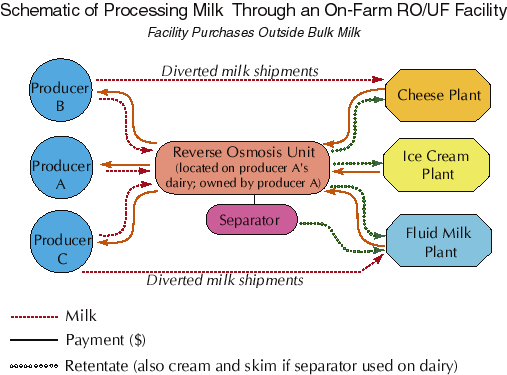Reverse Osmosis and Ultrafiltration
This guide is for California dairy farmers considering building an on-farm reverse osmosis processing facility or an on-farm ultrafiltration processing facility (an on-farm RO/UF facility). The Department of Food and Agriculture has provided this guide merely as an aid to dairy farmers. This guide is not a comprehensive list of all requirements placed upon the production, processing or handling of milk, nor does it change, limit or otherwise alter the statutory requirements placed upon the processing and/or handling of milk.
For pool accounting and payment requirements, this guide is only applicable when the ownership of the on-farm RO/UF facility is identical to the ownership of one of the dairies supplying milk to the facility (a producer-handler situation). In all other cases, the dairy and the on-farm RO/UF facility would be considered to be, respectively, a separate producer and a separate handler.
Contents
Glossary of Terms and Acronyms
| Term / Acronym | Definition |
|---|---|
| Retentate | Concentrated, retained liquid and milk components from the RO/UF process (for pool accounting purposes, the retentate will be accounted for in the same manner as for other in-state condensed milk products) |
| Permeate | The liquid passing through the filters in the RO process; in the UF process it is the liquid and the smaller molecule milk components |
| Outside Milk | When the on-farm RO/UF facility receives, acquires, or purchases bulk milk from any dairy farm whose financial interests are not identical to the financial interests of the on-farm RO/UF facility. |
| Qualifying Pool Plant | A plant that has direct Class 1 or 2 usage |
| RO | Reverse osmosis |
| UF | Ultrafiltration |
| MDFSB | Milk and Dairy Foods Safety Branch |
| AMIS | Approved Milk Inspection Service (8 county health departments) |
| MPB | Milk Pooling Branch |
| DMB | Dairy Marketing Branch |
| IMS | Interstate Milk Shippers |
Requirements for a RO/UF Facility Not Receiving Any Outside Bulk Milk
As a producer, you are considered a producer-handler if you operate an on-farm RO/UF facility (see Figure 1).
Figure 1.

Before the RO/UF facility is operational you will need (contact Milk and Dairy Foods Control Board for all items):
- Pre-approval by the Food and Drug Administration of the proposed process, the facility equipment, and the facility control design.
- A Milk Products Plant License – the minimum requirement is a separate milk processing room.
- An inspection of the processing facilities.
To operate the RO/UF facility you will need:
- A Dairy Farm Permit for the production of market milk (contact AMIS or MDFSB).
- Both a Milk Products Plant License and a Grade A Milk Processing Permit for the processing of market milk (contact MDFSB).
- An Industry Supervisor to sample for drug residue testing (contact MDFSB).
- A Licensed Weigher and Sampler to sample and measure production of all milk before processing (contact MDFSB).
- A listing of your farm as a source of Grade A raw milk under the Interstate Milk Shippers (IMS) program. Your RO/UF facility would require a separate IMS listing (contact MDFSB).
- If you retentate is to be received by a California handler, than you must have a valid contract with the handler who must be bonded and licensed (contact DMB).
Related Pool Accounting and Payment Requirements:
- If some of the retentate from your on-farm RO/UF facility is used in a Class 1 or 2 product, then you will be a pool plant, and you must file a Handlers Monthly Report - MPB Form 800 Report (contact MPB).
- If none of the retentate is used in a Class 1 or 2 product, then you will be a nonpool plant, and you must file a Nonpool Plant Receipts and Usage Report – MPB Form 210062 Report (contact MPB).
- If you own quota, you must be a qualifying pool plant (contact MPB).
- The contracting handler purchasing your retentate from your on-farm RO/UF facility must pay you for your retentate at the minimum class prices (contact MPB).
- If you are a pool plant, then you will have a pool obligation for all your bulk milk at the minimum class prices. You will have pool credits based on pool prices and your quota entitlements (contact MPB).
- The Milk Producer Security Trust Fund (MPSTF) may cover your retentate from your bulk milk when you sell it to a handler, provided that:
- the retentate is sold to a properly licensed and bonded milk handler and
- a contract for the sale of retentate is on file with Dairy Marketing Branch (contact DMB).
You will be responsible for reporting and paying any Producer Assessments on all bulk milk going into your on-farm RO/UF facility (contact MPB). These include:
- Pool Administration Fee (only if you are a pool plant),
- Market Milk Administration Fee,
- Dairy Council
- Milk & Dairy Foods Control Fee,
- Market Order
You will be responsible for reporting and paying any Handler Assessments on all bulk milk going into your on-farm RO/UF facility (contact MPB). These include:
- Market Milk Administration Fee,
- Dairy Council,
- Milk & Dairy Foods Control Fee,
- California Milk Processor Board
Requirements For a RO/UF Facility Receiving Outside Bulk Milk Contracted to a Third-Party Handler
Figure 2.

As a producer-handler you can also receive bulk milk from other producers who have a valid contract with a third-party handler for their milk (see Figure 2). The third-party handler can be the same handler you have a contact with for your retentate, or some other handler other than yourself. However, in addition to the items in I) above:
To receive other producers’ bulk milk at your RO/UF facility, you will need (contact MDFSB for all items):
- A modification to your Milk Products Plant License – the additional minimum requirements would be facilities for receiving and washing of tankers, including drug residue testing facilities.
- A Licensed Weigher and Sampler to sample for drug residue testing. Sampling for third-party testing on a smallest lot basis for the other producers’ milk will normally be done by the tanker truck driver.
- A listing of the other farms as sources of Grade A raw milk under the IMS.
Related Pool Accounting and Payment Requirements:
- Ifthe other producers shipping bulk milk to your on-farm RO/UF facility own quota, then you or the third-party handler must be a qualifying pool plant (contact MPB).
- If you or the third party handler are a pool plant, then the third-party handler with the contract will have a pool obligation for all the bulk milk of the other producers whose milk is diverted to your on-farm RO/UF facility. This obligation will be based on the blended utilization of all the retentate from your RO/UF facility at the minimum class prices. The third-party handler will have a pool credit based on the pool prices and the other producers’ quota entitlements (contact MPB).
- If both you and the third-party handler are nonpool plants, then the third-party handler with the contract must pay the other producers for their bulk milk a price based on the blended utilization of all the retentate from your RO/UF facility at the minimum class prices (contact MPB).
- The MPSTF may cover the bulk milk (not just their retentate) of the other producers contracting with a third-party handler provided that:
- the third-party handler is a properly licensed and bonded milk handler and
- a contract for the sale of their bulk milk is on file with Dairy Marketing Branch (contact DMB).
- The MPSTF will still only cover your retentate from your bulk milk (contact DMB).
Requirements For a RO/UF Facility Purchasing Outside Bulk Milk
Figure 3.

As a producer-handler you can have valid contracts with other producers shipping you bulk milk (see Figure 3). However, in addition to the items items listed above:
- To purchase other producers’ milk, you will need (contact DMB for all items):
- A Bond of $5,000 to $20,000.
- A Handler License to be issued once you supply proof of bonding.
- A valid Contract with the other producers once you are bonded and licensed. The contract must be on file with Dairy Marketing Branch.
Related Pool Accounting and Payment Requirements:
- If you or the other producers own quota, then you must be a pool plant (contact MPB).
- If you are a pool plant, then you will have a pool obligation. The obligation will be for all bulk milk (both yours and the other producers’) based on the blended utilization of all the retentate from your RO/UF facility at the minimum class prices. You will have a pool credit based on the pool prices and the quota entitlements of both you and the other producers (contact MPB).
- If you are a nonpool plant, then you must pay the other producers for their bulk milk a price based on the blended utilization of all the retentate (contact MPB).
- The MPSTF may cover any bulk milk purchased by you from other producers provided that:
- you are a properly licensed and bonded milk handler and
- a contract for the sale of the bulk milk is on file with Dairy Marketing Branch (contact DMB).
The MPSTF does not cover the retentate from the bulk milk purchased from other producers and processed in your on-farm RO/UF facility when you sell it to another handler. The MPSTF would still cover your own retentate (contact DMB).
Proposed Regulatory Changes
While the above is based on current statutes and regulations, the Department does have the administrative authority to change some of the above through changes in regulations. (Only the legislature can change statutes). At this time the Department is considering making two changes, although the industry is free to offer other changes. (Please contact MPB and DMB if you have any questions on these or any other possible changes).
- One possible change being considered is to oblige third-party handlers to pay you both for your retentate and for the other retentate from the bulk milk you purchase from other producers. The price would be based on the blended utilization of all the retentate from you on-farm RO/UF facility at the minimum class prices. This change in payment obligation would not extend coverage of the MPSTF. Thus, the MPSTF would at most cover the retentate from your own bulk milk.
- A second possible change being considered is to define certain terms such as qualifying pool plant, condensed products and concentrated products.
Other Considerations
The change in status from producer to producer-handler may have additional regulatory impacts beyond the scope of the Department of Food and Agriculture. Any producer considering installing an on-farm RO/UF facility would need to check any requirements of both local government and other state agencies. This could include, but is not limited to, Cal-EPA and your local Regional Water Quality Control Board.
Released January 1999

